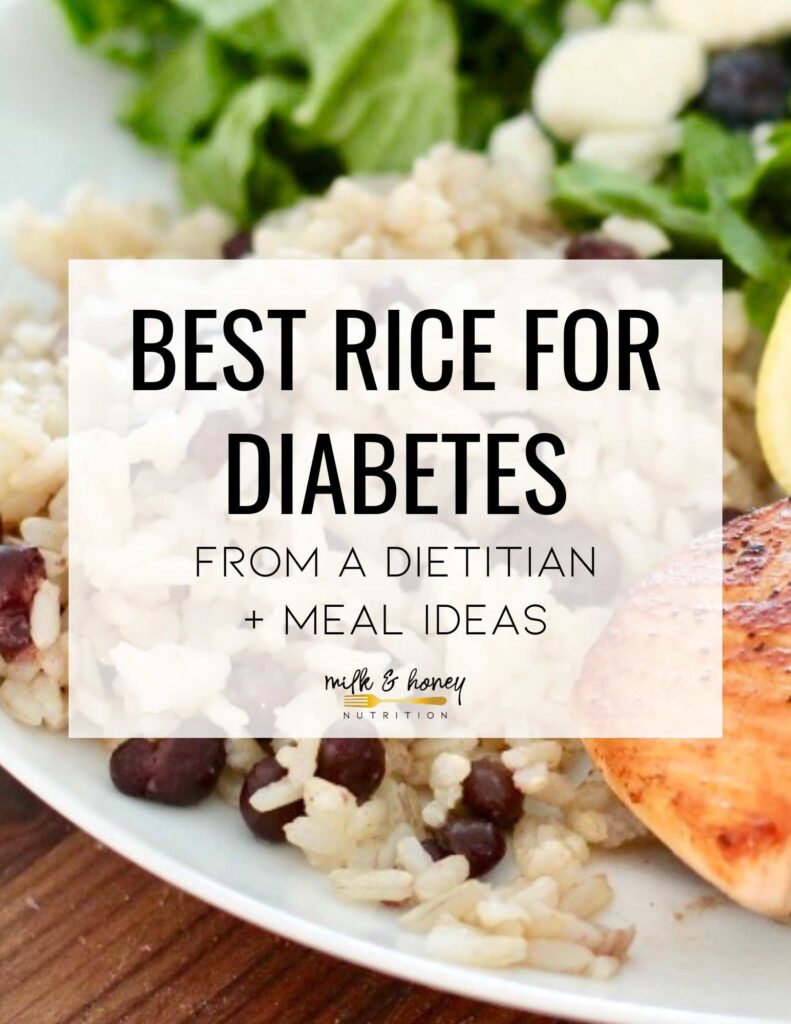
Rice is a staple food in many cultures and cuisines, but what is the best rice for diabetes?
Rice offers a delicious carbohydrate base to many dishes, but is often feared by people with diabetes. In this post, we’ll discuss some of the many ways people with diabetes can enjoy rice and the best rice for diabetes.
Can people with diabetes eat rice?
TLDR: Yes, people with diabetes can eat rice as part of a balanced diet.
Do we want to eat rice all by itself? No.
So, if you want to enjoy rice while living with diabetes, you absolutely can. We want to pair your favorite type of rice (more on that in a minute) with veggies, protein, healthy fats, and other protein and fiber sources.
Best rice for diabetes
Most of the general diabetes nutrition advice you will see online will tell you to choose whole grain or brown rice if you were living with diabetes. And, while whole-grain and brown rice have a lot of nutrients, including fiber, this recommendation ignores the fact that white rice is a staple in many cultures, cuisines, and dishes.
My professional and personal opinion as a registered dietitian and someone living with diabetes myself is that it’s important to consider the type of rice you want to eat and enjoy eating the most. And then, use that type of rice to build your meal… Adding in additional sources of vitamins, minerals, fiber, and protein as needed.
| Option 1 | Option 2 | |
| 1 cup white rice 1 cup broccoli 4oz lean beef | 1 cup brown rice 1/2 cup broccoli 4oz lean beef | |
| Fiber (g) | 5 | 6 |
| Protein (g) | 39 | 38 |
| Vitamin A (% DV) | 66% | 33% |
| Vitamin C (% DV) | 95% | 46% |
| Potassium (% DV) | 19% | 16% |
| Iron (% DV) | 22% | 28% |
In the above example, we are getting 1 additional gram of fiber and slightly more iron in option 2… but, 1 more gram of protein, and more Vitamin A, Vitamin C, and Potassium in option 1.
So while common advice often touts choosing brown rice over white rice, you can see how simply adding an additional half cup of vegetables with your white rice makes it just as good if not better, than brown rice.
Not to mention how different types of rice can be used as a vehicle to introduce other nutrient dense foods like vegetables into your diet!
Rice glycemic index values
Keeping that in mind, let’s look at the glycemic index value of a few different types of rice.
While we’ve established we can make most any type of rice work for people with diabetes, knowing the glycemic index value will help tell us which types of rice we need to be more intentional about adding additional sources of protein and fiber to.
White rice glycemic index
The glycemic index tells us how quickly a food can raise blood glucose levels. (But, it does not take into account how much carbohydrate is in a food though.)
The glycemic index of cooked white rice is 73. White rice is considered a high glycemic index food.
Does white rice have fiber?
White rice does not contain much fiber. One cup of cooked white rice has <1g fiber. This is why if we want to enjoy white rice and still maintain balanced blood sugars, it’s best to pair it with fiber and protein sources.
Brown rice glycemic index
The glycemic index of cooked brown rice is 68. Brown rice is considered a moderate/medium glycemic index food.
Does brown rice spike blood sugar?
While brown rice has more fiber than white rice, it is still a moderate/medium glycemic index food. If eaten on its own, most people will likely see larger rises in their blood sugar than they’re comfortable with.
Basmati rice glycemic index
Of all the various types of rice available, basmati rice has one of the lowest glycemic index values ranging from 50-58. This makes it either a low or medium/moderate glycemic index food.
Is basmati rice good for diabetes?
If you enjoy the taste of basmati rice and it fits in the recipes you like to make, it can be a better choice for people with diabetes than white rice or brown rice.
Rice with low GI index
If we just look at the glycemic index of a boiled form of rice, long grain rices like basmati rice and others will have the lowest glycemic index value.
But, as with other higher carbohydrate foods (like sweet potatoes), the way you cook your rice can also increase or decrease the glycemic index value and further impact what may be the best rice for diabetes.
And, as we saw above, adding higher fiber foods like vegetables and beans to your rice, can further decrease the glycemic index of your meal.
Does rice have sugar?
Believe it or not, rice doesn’t actually have a ton of sugar in it. This is a common misconception though, which likely comes from the fact that most of the carbohydrate in rice is starch. And starch is pretty easy for our bodies to digest. So, it can get converted to glucose pretty quickly compared to other foods (see our glycemic index conversation above for context).
But, there are some dishes, like sushi, that add sugar to rice while cooking.
Best ways to cook rice for diabetes
In addition to considering what you’re going to eat along with your rice, there are things you can do when cooking and prepping your rice that can reduce the glycemic index value even more.
Parboiled
Parboiled rice has been partially boiled (that’s where the name comes from) in its husk and then dried. Research has shown that parboiled rice may have less of an impact on blood sugars than regular white or brown rice.
Resistant starch
Just like other starchy foods, we can increase the amount of resistant starch in rice by cooling it down completely for several hours after cooking it… before we eat it.
When we cool down cooked rice, some of the starch gets converted to resistant starch. Just like the name implies, resistant starch is resistant to digestion. The body treats it like fiber. And you guessed it, that means it will likely have less of an impact on blood sugars than if we’d eaten our rice right away.
Frozen rice
Buying cooked rice from the frozen section is another great way to enjoy rice with diabetes. It was previously cooked and then frozen, which will also help increase resistant starch as we discussed above.
What is the best rice for diabetes?
Below are my top picks for the best rice for diabetes based on nutrition and flavor!
Note: Some of the links below are affiliate links. This means if you make a purchase through one of the links, we earn a small commission at no extra cost to you.
Frontière rice
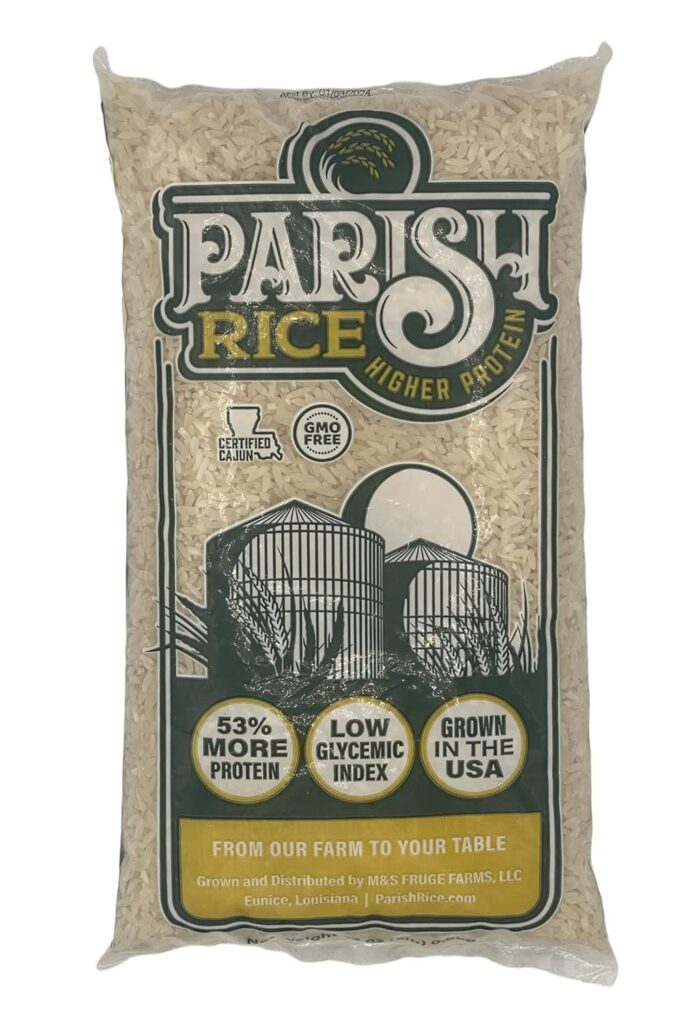
A new rice crop initially developed by food scientists at LSU offers roughly 50% more protein than standard long grain rice. Frontiere rice is currently being sold under two different brand names: Parish and Cahokia. The researchers at LSU report a glycemic index value of 41 which makes it a low glycemic index food.
Nutrition info for 45g uncooked:
- Total fat: 0g
- Total carbs: 34g
- Fiber: 0g
- Sugar: 0g
- Protein: 5g
Long grain white rice + vegetables and protein
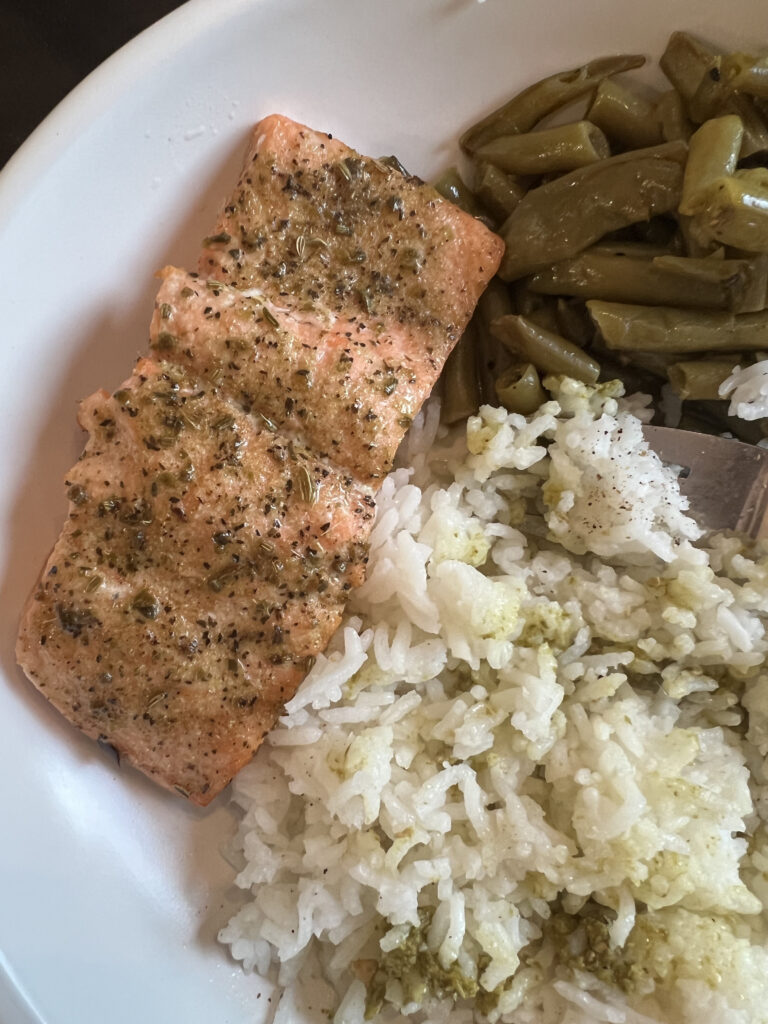
Most people prefer white rice, so I do think it’s important to show people with diabetes how they can enjoy white rice in a blood sugar friendly way like we did above. Pair your white rice with your favorite vegetables, legumes, and lean protein sources for a delicious and balanced meal.
Nutrition info for 50g uncooked:
- Total fat: <1g
- Total carbs: 40g
- Fiber: <1g
- Sugar: og
- Protein: 3.5g
Long grain brown rice + vegetables and protein
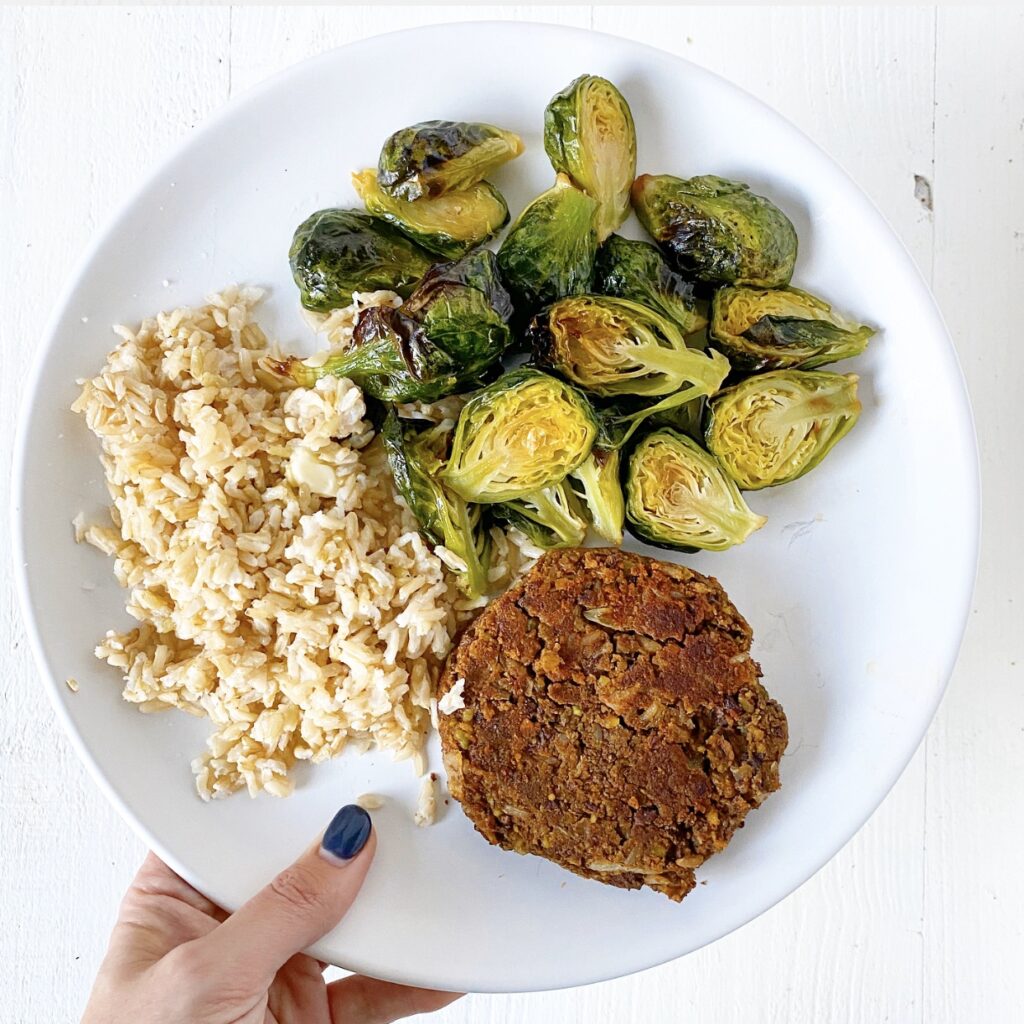
If you prefer brown rice, I also recommend pairing it with vegetables, legumes, and lean protein sources like we did with white rice. Both options when paired properly can provide a great balanced meal for people with diabetes.
Nutrition info for 50g uncooked:
- Total fat: 1.5g
- Total carbs: 38g
- Fiber: 2g
- Sugar: <1g
- Protein: 3.5g
Basmati rice
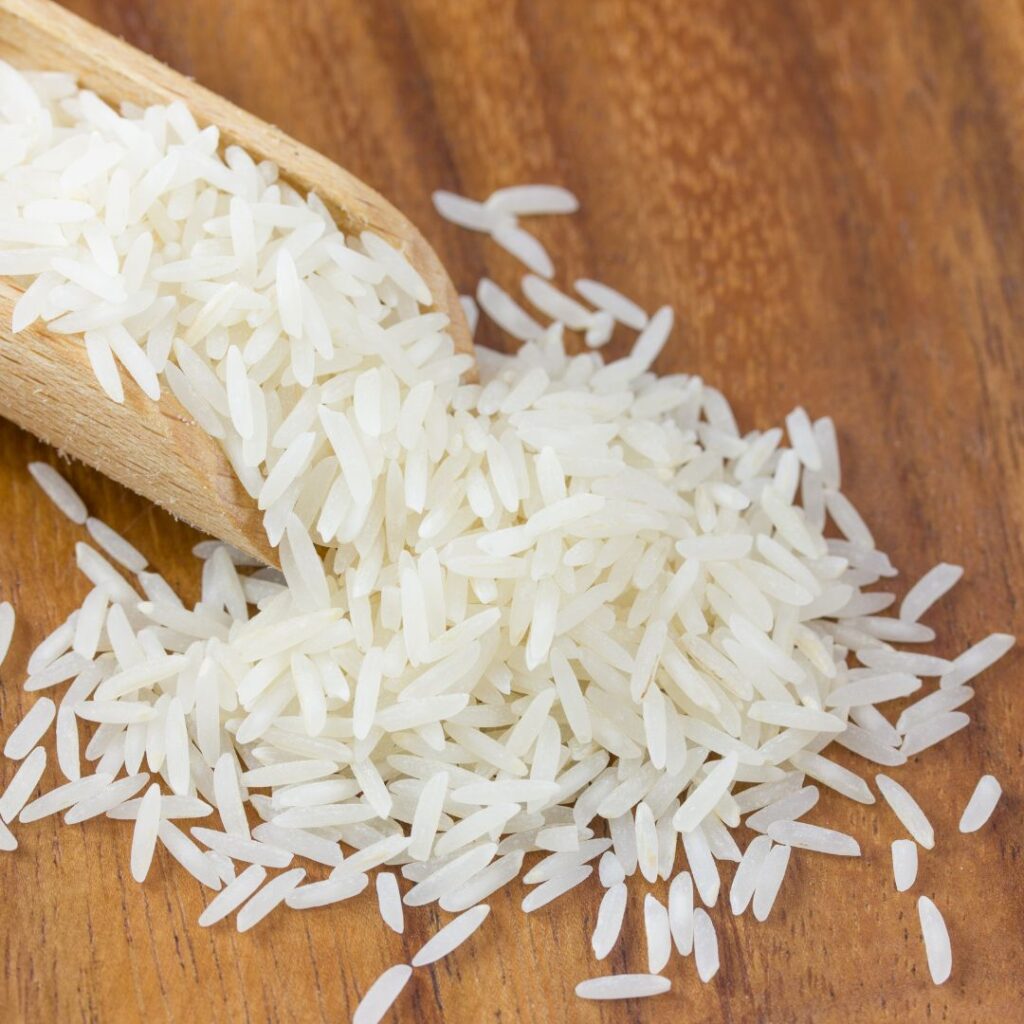
Basmati rice has one of the lowest glycemic index values for different types of rice. Brown basmati rice specifically has slightly more protein and fiber than other types of rice.
Nutrition info for 50g uncooked:
- Total fat: 2g
- Total carbs: 37g
- Fiber: 2g
- Sugar: 1g
- Protein: 4.5g
Parboiled rice
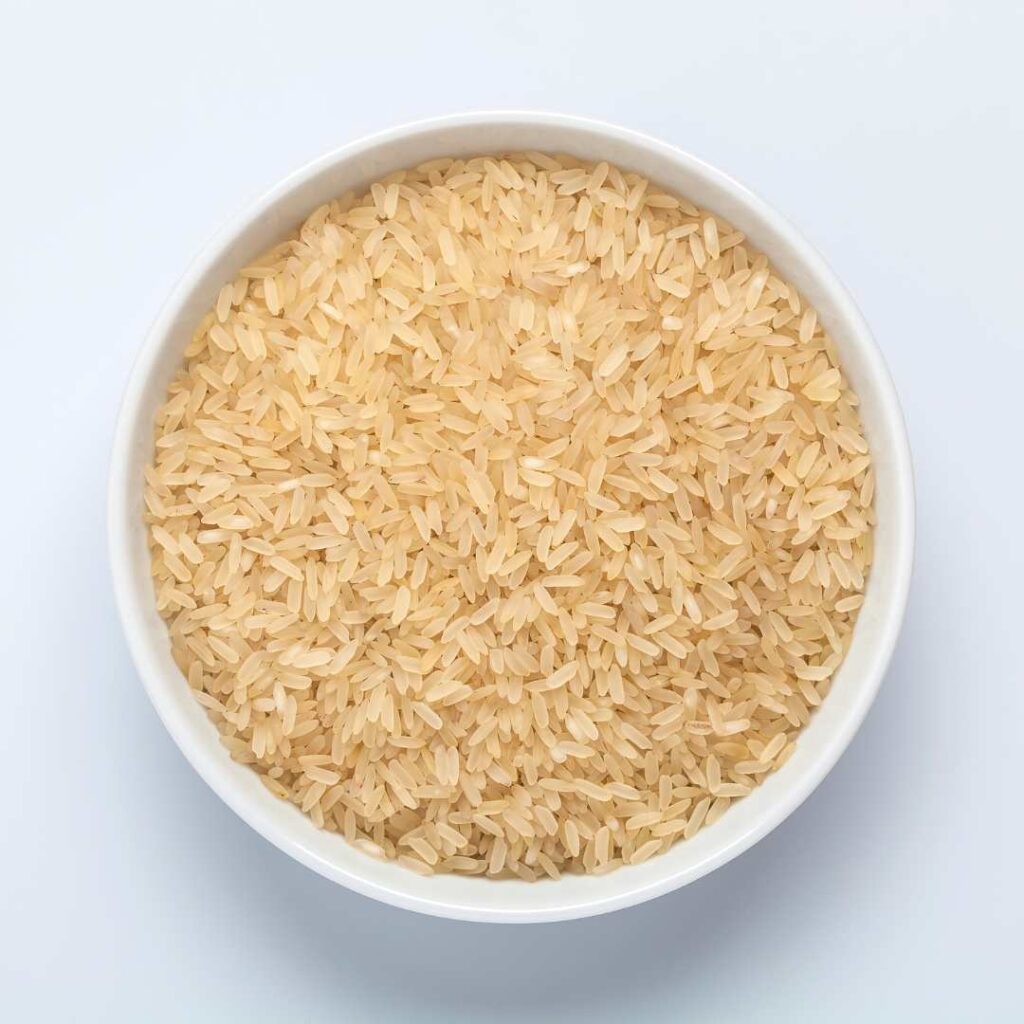
Parboiled rice can be another great option or people with diabetes because of the lower impact on blood glucose levels many people experience. This type of rice has been partially steamed or boiled inside of it’s husk and then dried. It is believed that this process increases the resistant starch found in the rice. As with many other forms of rice it is low in fiber and protein though, so make sure to pair your parboiled rice with protein and fiber sources.
Nutrition info for 50g cooked:
- Total fat: <1g
- Total carbs: 26g
- Fiber: <1g
- Sugar: <1g
- Protein: 1.5g
Wild rice
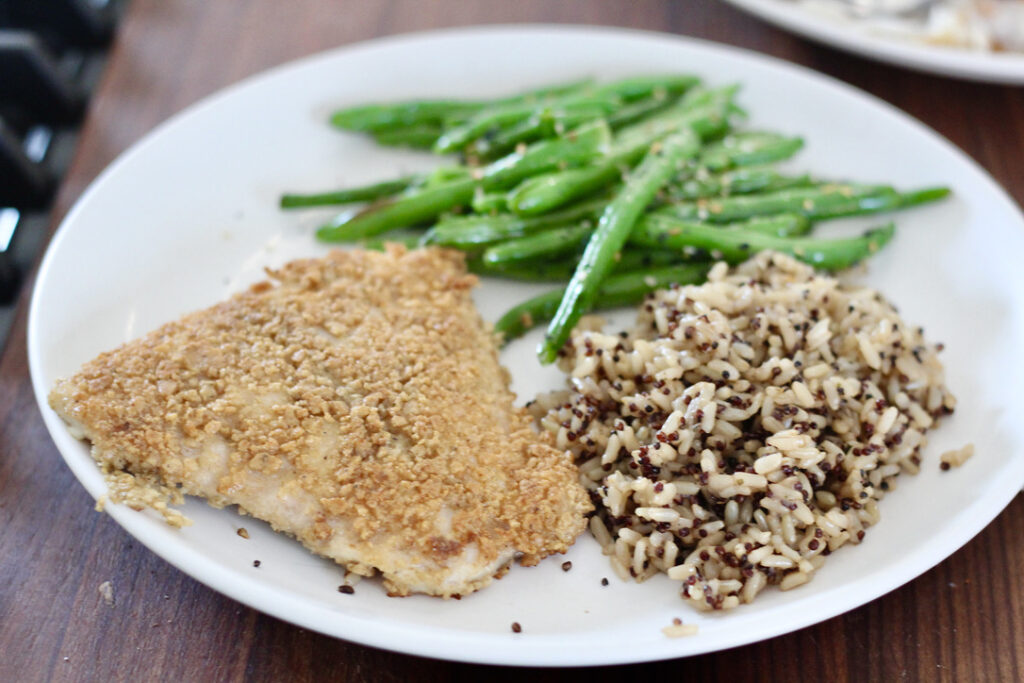
Like basmati rice, wild rice is higher in protein and fiber than other types of rices. And, it rivals the protein content of Frontiere rice which we discussed above. I also love the nutty flavor profile it has and the variety it can bring to many dishes.
Nutrition info for 50g uncooked:
- Total fat: <1g
- Total carbs: 38g
- Fiber: 3g
- Sugar: 1g
- Protein: 7g
RightRice
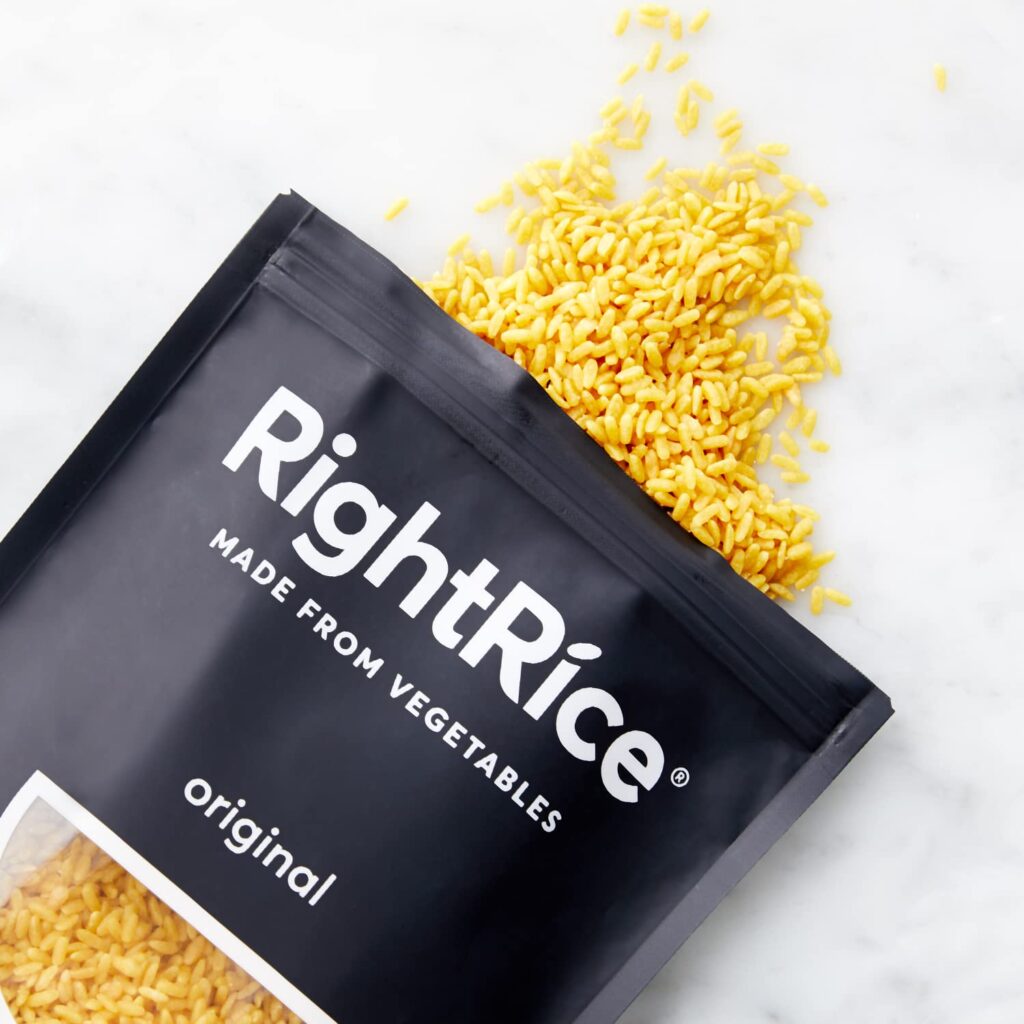
While RightRice is technically not rice, it does offer a higher protein and higher fiber alternative to traditional rice. It is made from lentils, chickpeas and peas, and comes in several different flavors. I personally love the lemon pepper variety!
Nutrition info for 50g uncooked:
- Total fat: 2g
- Total carbs: 30g
- Fiber: 5g
- Sugar: 0g
- Protein: 10g
Diabetes friendly rice recipes
Looking for new recipes to add your favorite rice to? These are two of my favorites and are both loaded with veggies, fiber, and protein.
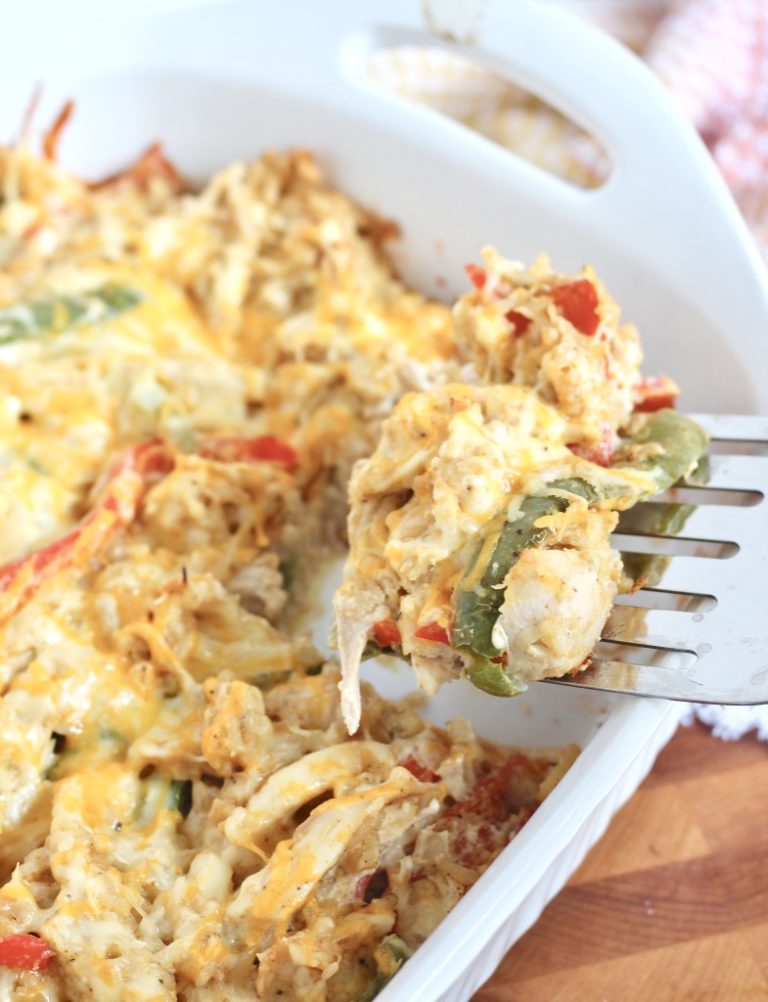
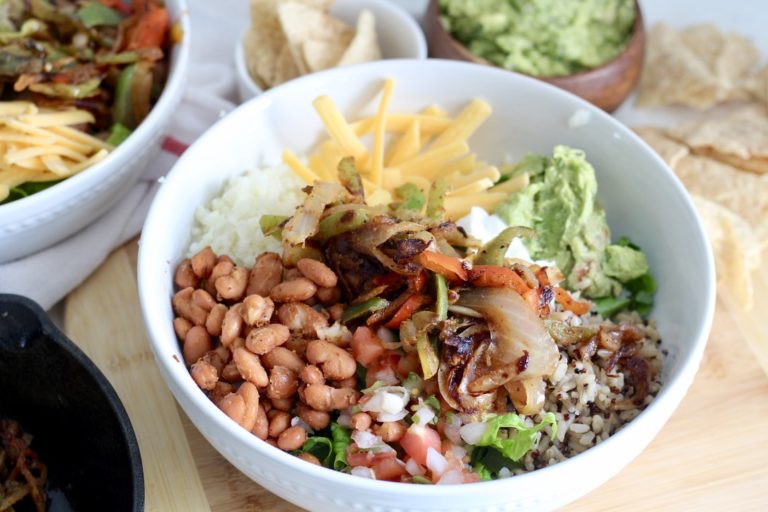
Bottom line: What’s the best rice for diabetes?
The best rice for diabetes is one that you enjoy eating, and you’re able to manage your blood sugar levels well when you eat it. For some people this may mean enjoying white rice with some extra veggies, and for others it may mean choosing basmati or wild rice.
Focus on adding fiber and protein sources to any variety of rice you choose to eat to help promote more stable blood sugar levels.
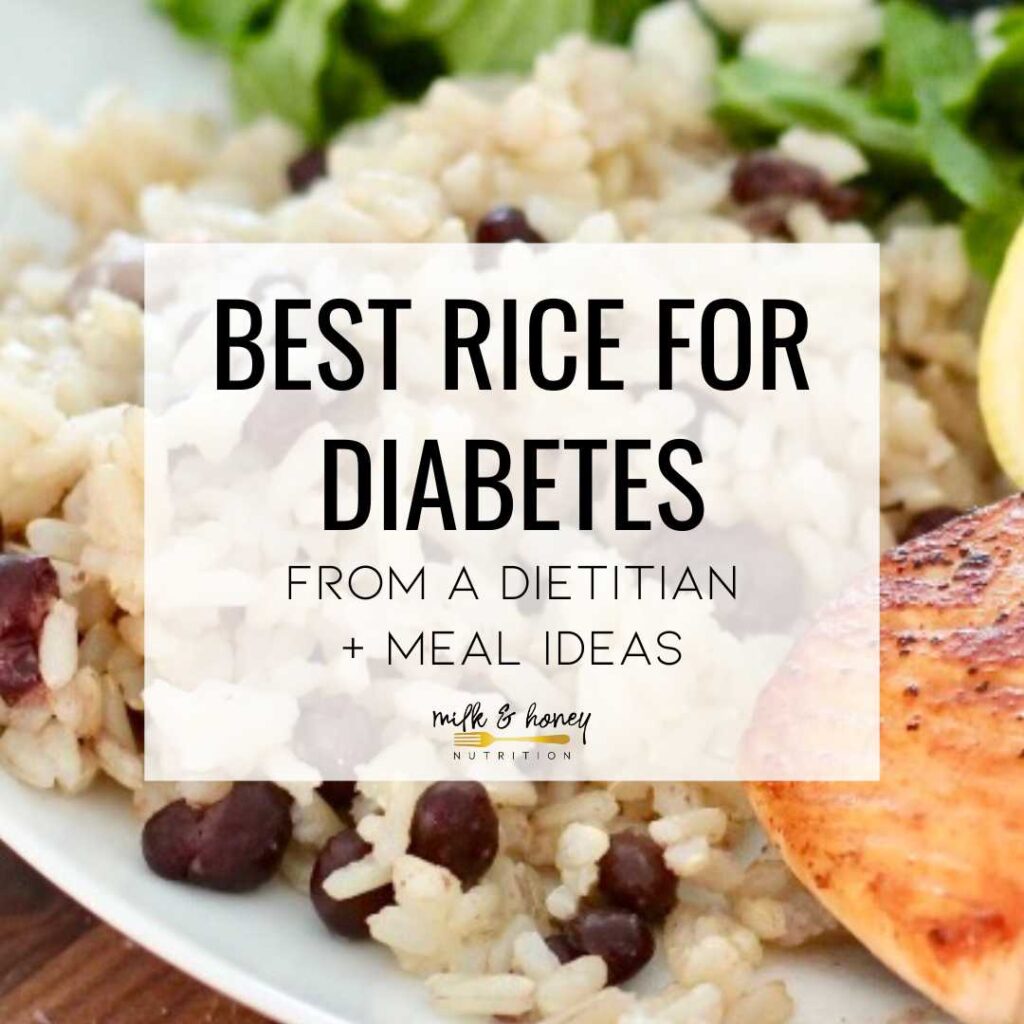
Sources
- Daily Value and Percent Daily Value on the Nutrition and Supplement Facts Labels (2023). FDA.
- International Tables of Glycemic Index and Glycemic Load Values (2008). American Diabetes Association.
- What is the glycemic index of Basmati rice? (2020). Livestrong.
- Which type of rice has the lowest glycemic index score? (2015). Tufts University.
- Parboiled rice metabolism differs in healthy and diabetic individuals with similar improvement in glycemic response, (2018). Nutrition.
- Effect of cooling of cooked white rice on resistant starch content and glycemic response (2015). Asia Pacific Journal of Clinical Nutrition.
- LSU-bred higher-protein, low-glycemic rice variety gains traction (2021). Rice Farming.
- Food Data Central, (2024). USDA.



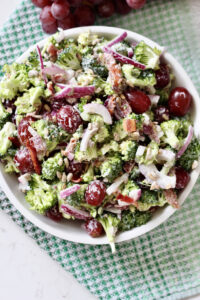

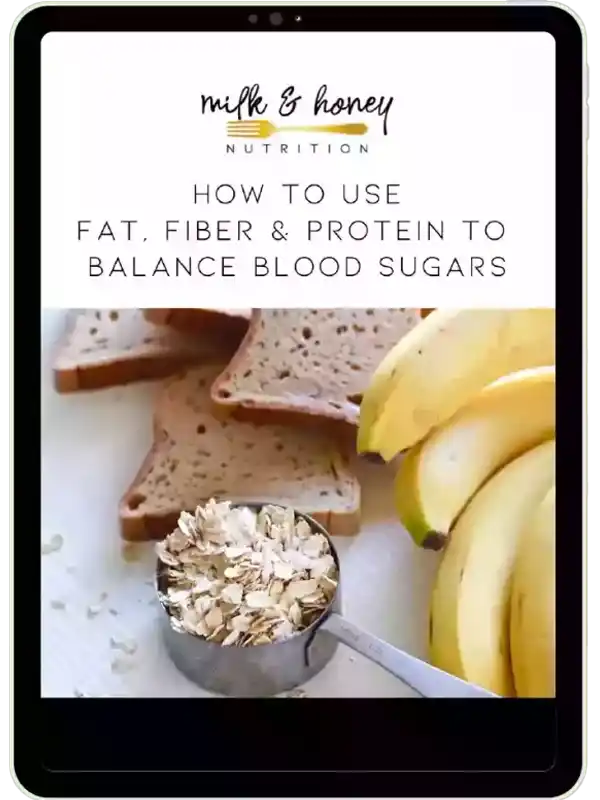
One Response
I am amazed and so grateful to read about rice! Yay – thought we had to give it all away and never buy again. Thank you!